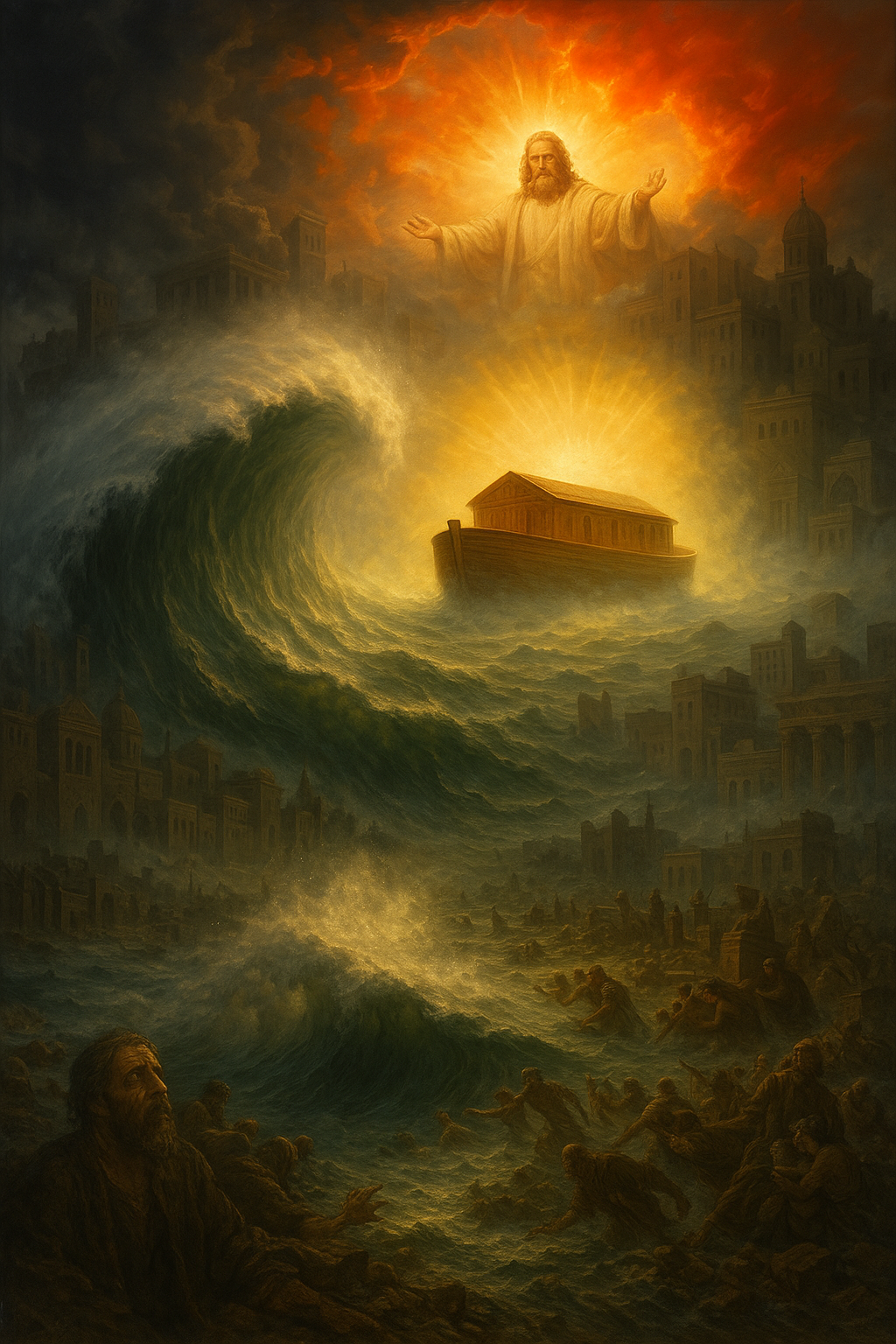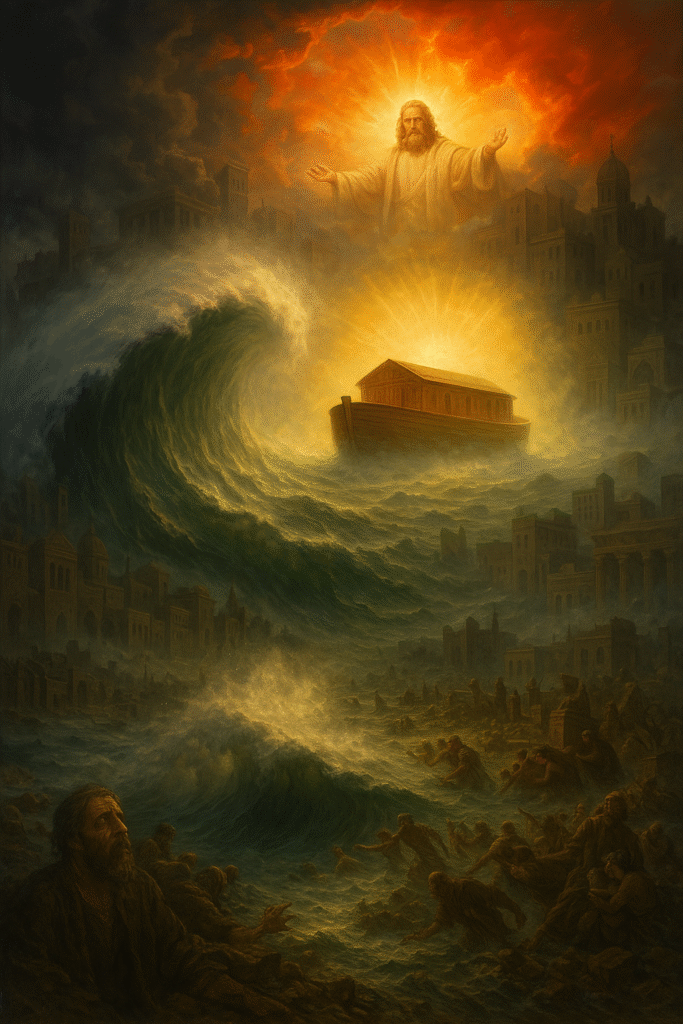Physical Address
304 North Cardinal St.
Dorchester Center, MA 02124
Physical Address
304 North Cardinal St.
Dorchester Center, MA 02124
With Michael Walker
With Michael Walker

To Whom it may concern….

There is a saying that claims one will never look into the eyes of someone whom God does not love. It sounds tender and humane, but a claim that grand must stand beneath the weight of covenant, justice, and consequence. Love that is real is not a vapor that drifts over anything without form; it has structure, boundaries, and a center. The Scriptures present Yahweh’s love as holy, discerning, and covenantal—love that heals the sick in truth, not love that baptizes corruption. The task, then, is not to drown in sentiment but to see how love moves where there is something left to unite with, and how judgment moves when union with evil is chosen and sealed. This is not a denial of love; it is the insistence that love be truthful. The flood remains the most sobering witness of this reality because it was love grieving while justice acted, a storm driven not by caprice but by holiness refusing to make covenant with malice.
Before the waters rose, the record does not describe Yahweh as indifferent; it describes Yahweh as grieved to the heart. The Hebrew word nāḥam names a sorrow so deep it aches—divine love pained by a world in which “every intent of the thoughts of the heart was only evil continually.” That line reveals something far more terrifying than scattered wrongdoing: it speaks of a humanity whose interior workshop had become a factory of malice. In such a world the distinction between host and parasite, between person and corruption, had collapsed. The eight preserved were not pets of favoritism; they were the place where alignment still existed, where fracture still remained between person and evil so that love could reach and rebuild. The flood was not love shutting off; it was love refusing to be perverted into complicity.
This reveals the principle at the center: union. Evil does not float in the air like pollen; it requires a host. When a host knowingly chooses evil—nurtures it, protects it, multiplies it—identity and corruption fuse. Once fused, the tidy maxim “love the sinner, hate the sin” loses traction, not because the axiom is always false, but because union has erased the separation the axiom assumes. Yahweh is unyielding about union. To love evil would be to deny Himself, and to love a host that has made itself one with evil would be to romance the very thing holiness must reject. Divine love cannot be turned into a blanket that covers the marriage bed of malice and calls it compassion.
Here a crucial distinction stabilizes the ground underfoot: sin versus malice. Sin is the congenital state of the race, the inherited blood pathogen of Adam’s line. Sin is a condition of deficit, estrangement, fracture—a sickness requiring cure. Yahweh’s patience endures on behalf of the infected, extending time for the cure and calling the sick under covenant covering through Yehoshua. Malice is another category. Malice is not merely infection; it is embodiment. Malice is the conscious handshake with evil, the decision to make corruption a craft, a home, and an heirloom. Where sin is weakness, malice is will. Where sin cries for medicine, malice fashions weapons. Where sin can be healed, malice entrenches identity. The first invites mercy’s surgery; the second summons justice’s sword.
This principle is not a fossil trapped in antediluvian amber; it operates in every generation. Inward hatred, racial supremacy, bigotry, misogyny, homophobia, prejudice, the purposeful sowing of division and deception—these become more than isolated acts when repeated and defended. They become a state of being, a culture, a household law, a banner under which children are catechized. Some even march such banners into sanctuaries and stamp them with God’s Name. That triple fusion—union with malice, union with deception, and union with counterfeit worship—does not stand as mere “human imperfection.” It is manufactured identity. It is the modern echo of hearts that once beat only evil continually, now dressed in religious language and ritual. Where this happens, the question is not whether Yahweh is loving enough; the question is whether there is anything left in that union for holy love to embrace without blessing evil itself.
Consequences follow union as surely as gravity draws water downhill. The flood shows the cosmic scale, but the same law operates personally and locally. Evil carries a detonator within itself; corruption contains its own collapse. Sometimes exposure arrives suddenly—hidden deeds drag into the light, reputations disintegrate, structures implode, movements wither, leaders are removed. Sometimes consequence arrives quietly—doors close, strength erodes, communities fragment, joy dies, families pay the tax of lies. Yahweh reserves sovereign right over timing and method, accelerating judgment where malice endangers others or calcifies beyond recovery, or delaying judgment to allow the sick opportunity to seek the cure. The ocean is the same in both cases; only the tide’s timing changes.
To understand consequence, consider how human law functions as a dim analogy. Break the law of man and there are structured responses: investigation, arrest, charges, trials, sentences. For lesser crimes there is probation or fines; for grievous crimes there is imprisonment; in some jurisdictions the ultimate penalty is death. No sane court declares that consequence is unloving simply because it is severe; the court declares that justice safeguards the living by refusing to crown the destroyer. So it is with Yahweh’s sovereignty. The Judge of all the earth does right. Removal from influence, confinement of harm, exposure of schemes, the collapse of predatory systems, even death—these are not tantrums from heaven but the outworking of a holy government that refuses to enthrone malice over the vulnerable. Injustice, hatred, and evil meet structured responses on both fronts. Human courts are fallible and often late; the divine court is flawless and never blindsided. Even when the docket is sealed from public view, justice is not idle.
The difference between patience and permissiveness must therefore be guarded. If judgment struck at the pace demanded by outraged observers, none would stand, for all fall short and all carry the blood-pathogen of sin. Patience exists not to excuse evil but to allow the infected to come under the cure. Yet patience is not infinite where malice is enthroned as identity. Those who choose union with calamity and cultivate it as craft invite a swifter reckoning. Their works do not go unseen. The time between sowing and harvest may vary by field, but harvest is not canceled. Divine delay is not divine indifference; it is the window in which medicine can still reach flesh.
Covenant covering is the place where love and justice meet without contradiction. Under that covering the sick are treated, the weak are guarded, and the bent are straightened. But covering cannot be forced without turning love into tyranny. Compelled love is not love; it is conquest. Yahweh will not strap the umbrella of covenant to those who despise its shade. By design, the way of life requires assent. That is why patience invites and judgment warns. Holiness refuses to dismantle freedom to manufacture false unity. The door remains open, but it is not pushed upon those who bolt themselves inside a house of malice.
This clarity abolishes false security—especially the paper shield of labels. The word “Christianity” can be printed on institutions that catechize hatred, sanctify prejudice, or trade in lies. A label does not confer covenant. A liturgy cannot launder malice. Where union with evil is chosen and defended, the separation between host and corruption collapses, and the old soothing cliché cannot apply. The saying that once sounded harmless becomes dangerous because it tells the malicious that love will bless their union without calling for severance. Divine love does not stroke the head of a wolf in shepherd’s clothing; it guards the flock and removes the predator. Where fruit is rancid by design, the tree is not misidentified; it is judged as it is.
The path forward is discernment anchored in covenant reality. Not every failure is malice; not every collapse is judgment. The question in every case is union. Is there fracture left between person and corruption—a line where surgery can separate flesh from tumor? If so, mercy races in with scalpel and bandage. Is there a welded fusion where the person has married malice and calls the vows holy? If so, judgment moves in defense of the living and the truth. Compassion is commanded for the sick; resistance is commanded to malice. This is not contradiction; it is coherence. The same hand that steadies the trembling will also pull a blade from the throat of the innocent and snap it in two.
The historical witness remains: Yahweh’s love is not an anesthetic fog. It is living, holy, covenantal love that refuses to be conscripted into evil’s army. Declaring that love indiscriminately blankets all things without distinction erases the line between healing and harm, between covenant and corruption. The flood is not a relic of a harsher deity; it is a mirror that shows what holiness does when malice devours a people from the inside out. The very same principle governs this hour. Sin invites cure; malice invites eradication. Patience is real; consequence is certain. The umbrella of covenant is open to all; it will not be strapped onto those who spit at its shade.
Let the conclusion carry the full weight it deserves. Love is not permissiveness, and justice is not the absence of love. Yahweh is love. Yahweh is justice. These are not rival attributes but one nature refusing self-contradiction. Where hearts and homes and systems enthrone malice and call it righteousness, consequence is not cosmic cruelty—it is cosmic mercy for the living and a stern refusal to canonize evil. Where fracture still remains, mercy rushes in with the cure through Yehoshua to reclaim what can be saved. The popular saying, stripped of its sentimentality, cannot carry the truth on its own; it needs the ballast of covenant and the bracing wind of holiness. The choice of union remains the hinge upon which destinies turn. Choose corruption, and corruption consumes. Choose covenant, and life endures under a covering that no flood can drown.